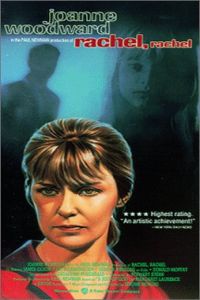
RACHEL, RACHEL
US, 1968, 105 minutes, Colour.
Joanne Woodward, James Olsen, Estelle Parsons, Kate Harrington, Geraldine Fitzgerald.
Directed by Paul Newman.
Rachel, Rachel was an outstanding success for the Newmans. It was Paul Newman's first film as a director and he shows a remarkable sensitivity for a woman's life and problems and a poetic beauty, precision and symbolism that make the film an experience worth more than one viewing. Newman has acted 1n many films with his wife, Joanne Woodward, and knows how to get the best out of her expressive, but plain features.
Joanne Woodward is Rachel, the middle-aged little girl who has achieved so little and who, at thirty-five, has known little love and sees all her life now as a descending to the grave. She grasps at love only to find it has never been real; she longs for a child and is mistaken in her belief that she is pregnant. Finally she makes a decision and we see the possibilities of a new Rachel.
This film 1s a moving experience for women, but speaks to all adult audiences who know anything of loneliness.
1. Are there many Rachel’s in the world, or is this 'slice of life' a look at an unusual situation?
2. What is the mood of the film and how is it created? Note the opening with the scenes of the town's houses; Rachel waking, imagining herself dead, and her going to school, feeling self-conscious.
3. Rachel says she is in the very middle of her life, her last ascending year, all the rest is descending to the grave. Is she right?
4. Did Rachel have a happy childhood? Why does she keep remembering only her childhood as a little girl? Note the continual reminders of death; Rachel, 'the undertaker's daughter'?
5. Why is Rachel self-conscious? What is the content of her fantasies? - being loved, being kind, killing her mother, herself as dead?
6. Rachel's mother? Her way of life? Her chocolate bars, her gossip, her cards and her friends?
7. Was Rachel a good teacher?
8. Discuss her friendship with Calla - as teachers, Cella’s gift, Calla calling her 'child', her criticism of Rachel's mother, the Revivalist meeting, the kiss, the cooling of the friendship, Cella’s final help for a new job as Rachel turned to her for help.
9. What was the point of the inclusion of the Revivalist scene - what did it communicate about the town, Calla, Rachel, the man with the gift of tongues, the nature of communication and repression, religion, fear?
10. Why did Rachel make so little of her decision to go with Nick? How did she understand the situation? He 'wanted some action'. Why did he run away?
11. Rachel longed for love and a baby - why? She says she wanted something living inside her, a thing she thought impossible.
12. Did Rachel make the right decision in the end? Should she have forced her mother?
13. What future was there for Rachel? "Where I go anything may happen, nothing may happen" - "a friend, a widower, and children". "I will always be afraid - and lonely". "All my children may be temporary, but maybe all children are temporary."
14. What did the film communicate to you about loneliness, frustration, the need for love, devotion to parents, death?
15. Rachel says at one stage, "Back to our respective cages," Calla lets a bird go free and says, as Rachel goes, that she is always letting birds go free, the final images are of a gull flying on the sea-shore and Rachel walking with a little child. What does this mean?